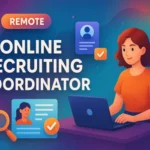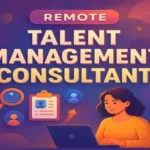Virtual Workforce Strategist
Description
Virtual Workforce Strategist
Are you ready to redefine how remote teams operate? Do you excel in strategizing workforce solutions that empower businesses to thrive while fostering innovation and collaboration? We’re seeking a dynamic Virtual Workforce Strategist to join our team and lead the way in shaping the future of remote work.
Who We Are
We’ve established ourselves as leaders in guiding organizations to adapt to the evolving remote work environment. We've partnered with businesses from start-ups to global enterprises to reimagine their work models. Our mission is straightforward yet powerful: help organizations unlock the potential of their remote workforce. With a solid foundation of expertise and proven success, we are eager to welcome a strategist who can elevate our vision.
Why This Role Matters
Remote work is no longer a temporary solution; it is the future of work. Companies that adapt effectively gain agility, innovation, and a competitive edge. As our Virtual Workforce Strategist, you will be instrumental in helping organizations navigate this transformation. You will design and implement strategies to enhance remote work processes while fostering a connected, motivated, high-performing workforce. Your impact will resonate across businesses and their teams worldwide.
Your Day-to-Day Responsibilities
Strategic Planning
🎯 Strategic Planning: Create and execute comprehensive workforce strategies that align with client objectives, ensuring seamless implementation and outstanding outcomes.
Data-Driven Insights
📊 Data-driven insights: Analyze workforce metrics to identify trends and provide actionable recommendations for improving efficiency and engagement.
Innovation & Solutions
💡 Innovation & Solutions: Research and introduce innovative tools and methods to boost virtual team collaboration and productivity.
Collaboration & Communication
🤝 Collaboration & Communication: Partner with leaders, HR teams, and employees to promote transparency, alignment, and a culture of collaboration.
Training & Development
📚 Training & Development: Design and deliver training programs that empower remote teams with skills in communication, time management, and technology utilization.
Continuous Improvement
📈 Continuous Improvement: Monitor emerging trends and technologies in remote work to ensure our clients maintain a leading position in the industry.
What You Bring to the Table
We seek a results-oriented professional with a strong ability to innovate and adapt. Here’s what makes you a great fit:
Experience
✅ Experience: At least 5 years in workforce strategy, HR consulting, or a related field, with a strong focus on remote work environments.
Leadership Skills
✅ Leadership Skills: Ability to inspire and lead diverse, cross-functional teams toward common goals.
Tech-Savvy
✅ Tech-Savvy: Proficiency in remote work tools (e.g., Slack, Zoom, Trello) and a commitment to leveraging technology for better outcomes.
Analytical Mindset
✅ Analytical Mindset: Skilled in data analysis, able to interpret metrics and develop actionable strategies.
Communication Excellence
✅ Communication Excellence: Exceptional communicator capable of delivering clear, engaging messages to diverse audiences.
Creativity & Problem Solving
✅ Creativity & Problem Solving: Adept at developing innovative solutions to unique challenges in the remote workspace.
What We Offer
Impactful Work
🌟 Impactful Work: Be part of initiatives that redefine the workplace and drive significant improvements for businesses and employees.
Competitive Compensation
🌟 Competitive Compensation: An annual salary of $95,500, recognizing your expertise and contributions.
Work-Life Balance
🌟 Work-Life Balance: Enjoy a fully remote position with flexible hours to maintain a healthy work-life integration.
Growth Opportunities
🌟 Growth Opportunities: Access training, mentorship, and career advancement pathways to support your professional development.
Supportive Culture
🌟 Supportive Culture: Join a collaborative, inclusive, and creative environment that values every team member.
Additional Perks
🌟 Additional Perks: Benefit from wellness programs, virtual team-building activities, and resources dedicated to your personal and professional well-being.
Ready to Join Us?
We’re looking for a changemaker ready to revolutionize businesses' remote work practices. We encourage you to apply today if you're passionate about making a lasting impact. Together, we can craft innovative workforce solutions that set new industry standards.
Your journey begins here. Let’s achieve extraordinary success together. Publish Date: Jan 24, 2025



